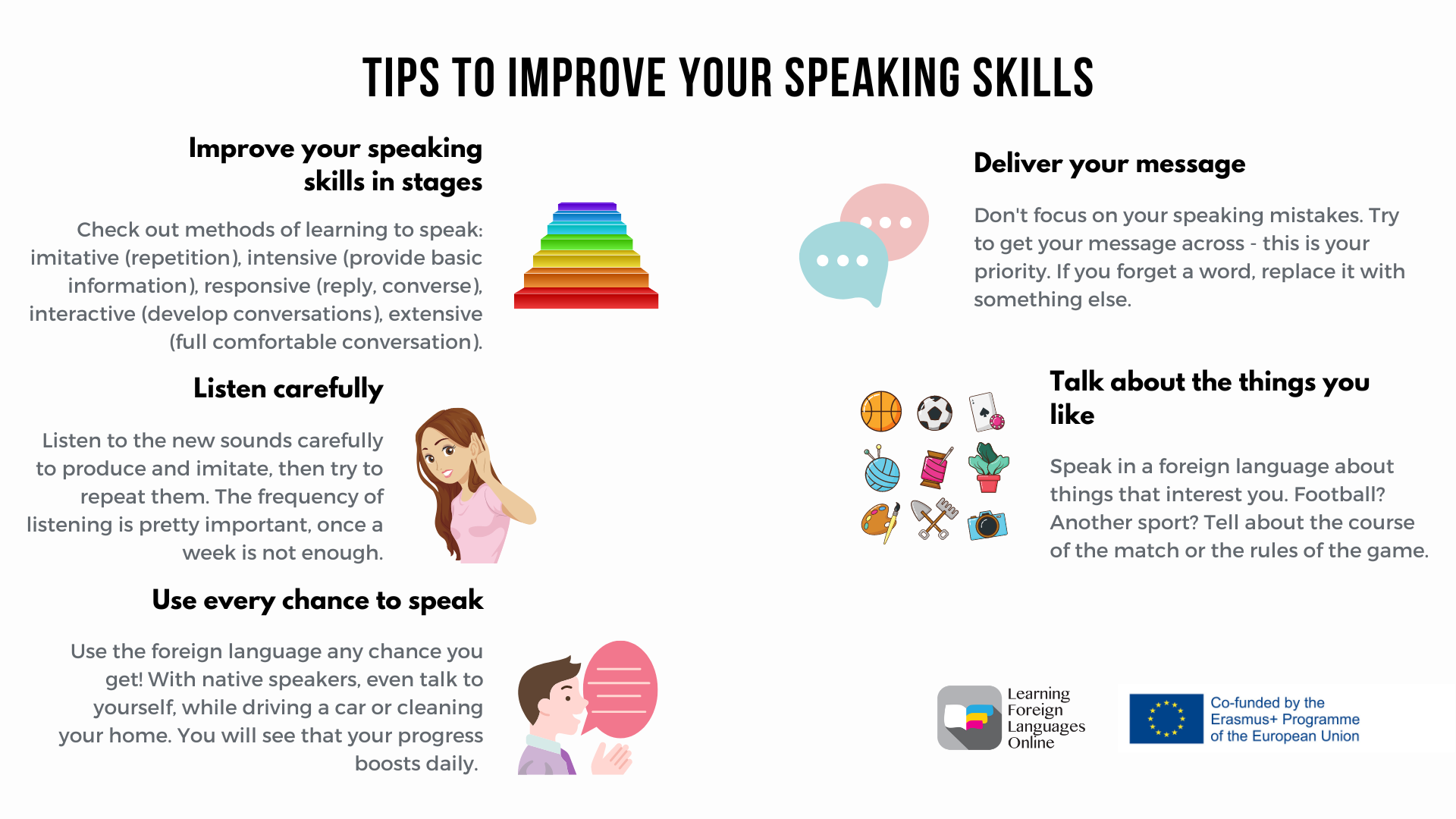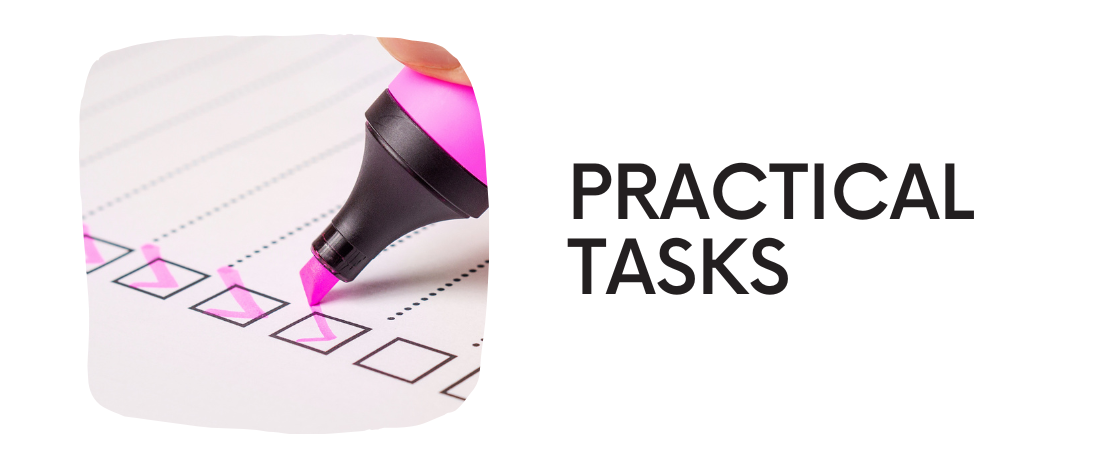
E-course
Speaking
Module 2 | Unit 9
Introduction

Speaking! Most people feel anxious and nervous when they need to speak in a foreign language, and they give up. This is a big mistake because speaking well comes with practice. It is the ability to express our feelings, ideas, questions, orders, gratitude, and thoughts. It allows us to communicate with others, so it’s a social and communicative language skill. Speaking is not just a dialogue with our friends, speaking is very useful because it helps us in different situations – asking for help, directions, meeting new people and it creates new opportunities for us, in social and work situations.
Speaking is something rather powerful. Imagine two people with quite different backgrounds, even from very far away places across the globe, who can communicate with each other and share some ideas and thoughts, is it magic? No, it is indeed the power of communication.
Getting started

Tips
Tips to improve your speaking skills

1. Try to improve your speaking skills in stages:
As we already previously stated, the essence of any communication in any language is to understand and be understood, that is, to express ourselves; our thoughts, wishes, questions, and requests. Speaking allows us to do all this.
There are many benefits that come with improving speaking skills, some of them include the boost to your confidence, the ability to make new social connections, the development of your vocabulary and improvement of thinking speed in a foreign language.
Improving speaking skills may seem like a task that is challenging and that has no “beginning” and no “end”. Try to improve your speaking skills in stages:
- Imitative: This is the easiest and most basic type of speaking. It is simply repeating what you have heard or what someone else has said. Imitative speaking helps you imitate the basic sound of your new language. Try to repeat and imitate the new sounds, it doesn’t matter if you don’t understand what is being said.
- Intensive: At this stage you have already got some grammatical and lexical knowledge, so you can speak in phrases and sentences and express your ideas or thoughts. You can give basic information and understand what people say.
- Responsive: Here you can respond to people’s questions and chat with them in simple and short sentences. Also, you can ask them questions. As you can see, the interpersonal communication starts at this stage.
- Interactive: The communication grows at this stage. You can maintain relationships and long conversations. You will be able to say much more than saying yes or no or giving directions in a foreign language.
- Extensive: You feel comfortable having conversations with someone in a foreign language. You can also reply to each question and add new information adding details, listening carefully analyzing the information that the person you are talking to is giving you.
2. Listen carefully
Listening is the first stage of speaking. First, listen to the new sounds carefully to produce and imitate, then try to repeat them as many times as you need to imitate the new sounds. Try short words that have just two or four letters, and then longer ones. Listening also makes your pronunciation more accurate. The frequency of listening is pretty important, once a week is not enough. 10 – 15 min daily is the best! The reason is that you will train your hearing, and as you repeat the sounds and words you will train the muscles in your mouth and lips to learn new positions you need to speak in a language that has different sounds from your own. Your brain will memorize the new postures to make your pronunciation more accurate.
3. Use every chance you get to speak
If you really want to learn a language, you have to practice a lot. When it comes to speaking, use the foreign language any chance you get! With native speakers, even talk to yourself, while driving a car or cleaning your home.
You will see that your progress boosts daily. Practice the new sounds of the language you are learning in front of a mirror, it is not only funny, but also extremely useful. Take note of the positions your mouth and tongue have in every new sound you are learning so you can practice even without the mirror. Don’t learn a lot of new sounds at once, learn one or two at a time and when you feel confident enough move to the next ones. Use any opportunity you have to speak, thinking of groceries you need to buy, names of furniture in your home, things you see every day on your way to work or the supermarket. No opportunity to verbally use the language you are learning is small, go one step at a time.
4. Deliver your message
Many learners are afraid to speak because they focus on their mistakes and the lack of vocabulary. They think others will judge them for their poor grammar and bad pronunciation, but in reality, native speakers will appreciate any person’s attempt to speak their language! They will be encouraging and grateful that you have made the effort to learn another foreign language and help you speak it. Remember, the most important part of any communication is to deliver your message and understand what the other person wants to say. So, if you can’t remember a word, try to paraphrase and use other words to describe it. It doesn’t have to be perfect, rarely anything in life is.
5. Find the things that you like in your new language
You surely like speaking about something in your language. What is it? Football? Fashion? Films? Travels? Whatever it is, try to speak about it in your target language. It helps your motivation and makes the initial learning easier because if you speak about things you like, you will always have ideas about what you want to talk about.

QUOTES:
• “Good communication is the bridge between confusion and clarity” Nat Turner
• “If you can speak, you can influence. If you can influence, you can change lives”
• “A relationship without communication is just two people”
• “With languages, you are at home anywhere” Edmund De Waal
• “Effective teamwork begins and ends with communication” Mike Krzyzewski
More resources

Still want to continue learning about the topic of this unit? Not to worry, we have made a selection of further resources that you can use if you would like to find out more. Just click on the links and keep learning!
Practical tasks

 Check the Android app which is very useful for learning new vocabulary. Introduce the new vocabulary that you want to learn slowly. Then review it periodically, read the word aloud and then try to explain the meaning of the word in your target language, even if it’s a simple word you already know, like dog or cat. This exercise will help you pronounce words correctly while reviewing the vocabulary. The app has a feature that tracks the amount of time it takes you to review new words, this will make tracking your progress easier. This is an app you can use and sync on all of your devices which makes it easy for you to learn whenever it is suitable for you.
Check the Android app which is very useful for learning new vocabulary. Introduce the new vocabulary that you want to learn slowly. Then review it periodically, read the word aloud and then try to explain the meaning of the word in your target language, even if it’s a simple word you already know, like dog or cat. This exercise will help you pronounce words correctly while reviewing the vocabulary. The app has a feature that tracks the amount of time it takes you to review new words, this will make tracking your progress easier. This is an app you can use and sync on all of your devices which makes it easy for you to learn whenever it is suitable for you.
 Listen to a brief and easy recording that is suitable for your level, choose something quite short, a few seconds long. Listen to it and record your voice trying to imitate it. Do you notice differences? Try again and try to pronounce it better this time. It will enhance your pronunciation and your listening skills.
Listen to a brief and easy recording that is suitable for your level, choose something quite short, a few seconds long. Listen to it and record your voice trying to imitate it. Do you notice differences? Try again and try to pronounce it better this time. It will enhance your pronunciation and your listening skills.
 Practice a monologue in front of the mirror, it is a pretty simple task, but it works. Choose your favourite scene from a favourite movie or a TV series in your target language. Memorize some sentences and try to perform them. How do you look speaking a foreign language? Nice, for sure.
Practice a monologue in front of the mirror, it is a pretty simple task, but it works. Choose your favourite scene from a favourite movie or a TV series in your target language. Memorize some sentences and try to perform them. How do you look speaking a foreign language? Nice, for sure.
 Imagine three different situations you might find yourself in while speaking the foreign language you are learning. It can be something as simple as buying a shirt and as complicated as a job interview. For each of these situations, try to come up with imaginary dialogues. Memorise the questions you might ask during these conversations and try to answer them yourself pretending to be someone else.
Imagine three different situations you might find yourself in while speaking the foreign language you are learning. It can be something as simple as buying a shirt and as complicated as a job interview. For each of these situations, try to come up with imaginary dialogues. Memorise the questions you might ask during these conversations and try to answer them yourself pretending to be someone else.
 Work with a partner. Write down unusual topics you don’t know a lot about (farming in China, brain surgery, traditional weddings in Morocco, etc.) One of you pretends they know everything about it. The other one asks questions. The point of the game is not to say “I don’t know”. If you say I don’t know you lose the game.
Work with a partner. Write down unusual topics you don’t know a lot about (farming in China, brain surgery, traditional weddings in Morocco, etc.) One of you pretends they know everything about it. The other one asks questions. The point of the game is not to say “I don’t know”. If you say I don’t know you lose the game.
Unit test

